
TROPICAL AGRICULTURE
Scope & Guideline
Nurturing the growth of agronomic research in the tropics.
Introduction
Aims and Scopes
- Crop Science and Agronomy:
Research on the growth, yield, and management of various crops, including studies on nutrient management, irrigation practices, and the impact of environmental factors on crop performance. - Animal Husbandry and Veterinary Science:
Studies focusing on livestock management, nutrition, and health, including the effects of dietary supplements and management practices on animal production and welfare. - Pest and Disease Management:
Research dedicated to understanding and managing agricultural pests and diseases, including the use of biological control methods and the development of resistant crop varieties. - Soil Science and Fertility:
Investigations into soil properties, fertility management, and the impact of various agricultural practices on soil health and productivity. - Food Security and Nutrition:
Research aimed at improving food security through sustainable agricultural practices, food processing, and enhancing the nutritional value of food products. - Agroecology and Sustainability:
Exploratory studies on sustainable agricultural systems, biodiversity management, and the socio-economic aspects of agriculture in tropical regions.
Trending and Emerging
- Sustainable Agricultural Practices:
There is a growing emphasis on sustainable farming methods, including organic farming, agroecology, and permaculture, which promote environmental health and resource conservation. - Biotechnology and Genetic Research:
Research utilizing biotechnological approaches to improve crop resilience, pest resistance, and nutritional quality is gaining traction, reflecting advancements in genetic tools and methodologies. - Climate Resilience and Adaptation Strategies:
Studies focusing on how agricultural systems can adapt to changing climate conditions are increasingly prevalent, highlighting the need for resilience in food production systems. - Precision Agriculture Technologies:
The application of precision agriculture techniques, including the use of data analytics, remote sensing, and smart farming solutions, is emerging as a key area of research. - Nutritional Enhancement of Crops:
Research aimed at biofortifying crops to improve their nutritional profiles is becoming more prominent, addressing global concerns about malnutrition and food security.
Declining or Waning
- Traditional Farming Practices:
Research on traditional farming practices appears to be waning, as there is a shift towards modern agricultural techniques and scientific approaches to improve productivity and sustainability. - Single Crop Studies:
The focus on studies that exclusively examine the performance of single crops without considering intercropping or agroecological systems is declining, as more research emphasizes integrated approaches. - General Agricultural Economics:
Broad analyses of agricultural economics are becoming less common, with a trend towards more specific studies that address particular aspects of the agricultural value chain or specific commodities. - Climate Change Impacts:
While climate change remains a significant concern, research specifically addressing its impacts on agriculture in tropical regions has decreased, possibly due to a shift towards adaptation strategies and resilience building. - Post-Harvest Technology:
Research on post-harvest technology and food processing techniques is less frequently published, suggesting a potential gap in addressing food loss and waste issues.
Similar Journals
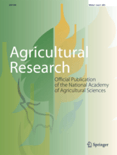
AGRICULTURAL RESEARCH
Empowering researchers to tackle contemporary agricultural challenges.AGRICULTURAL RESEARCH is a distinguished academic journal published by SPRINGER INDIA, focusing on the dynamic fields of Agronomy, Crop Science, and Food Science. With an ISSN of 2249-720X and E-ISSN of 2249-7218, this journal has established itself as a valuable resource for researchers, professionals, and students dedicated to advancing agricultural knowledge and practices. The journal is recognized in the 2023 Scopus Rankings, achieving commendable quartile positions, including Q2 in Agronomy and Crop Science and Plant Science, as well as Q3 in Food Science, indicating its influential presence in the academic community. AGRICULTURAL RESEARCH aims to disseminate cutting-edge research findings, innovative methodologies, and comprehensive reviews, fostering collaboration and discussion among scholars in Switzerland and beyond. Through its commitment to scholarly excellence, this journal is pivotal in addressing contemporary challenges in agriculture, ensuring sustainability, and enhancing food security for the future.
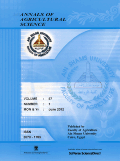
ANNALS OF AGRICULTURAL SCIENCES
Unveiling the Science Behind Sustainable AgricultureANNALS OF AGRICULTURAL SCIENCES, published by Elsevier, stands as a leading open access journal dedicated to the multifaceted field of agricultural sciences. Since its inception in 2011, this journal has served as a pivotal platform for the dissemination of high-quality research, covering areas such as agronomy, animal science, horticulture, food science, plant science, and soil science. With an impressive Q1 ranking across multiple disciplines and notable positions in Scopus Ranks—including #6 in Animal Science and Zoology and #3 in Horticulture—this journal is recognized globally for its significant contribution to advancing agricultural innovations. The journal caters to a diverse audience of researchers, professionals, and students, providing them with open access to cutting-edge studies that address critical issues in agricultural productivity and sustainability. Its commitment to high-impact research ensures that articles contribute meaningfully to the scientific community, fostering advancements in agricultural practices and policies.

Romanian Agricultural Research
Exploring Agronomy to Enhance Global PracticesRomanian Agricultural Research is a prominent academic journal dedicated to advancing the field of agricultural science with a specific focus on agronomy and crop management. Published by the NATL AGRICULTURAL RESEARCH & DEVELOPMENT INST in Romania, this journal has established itself as an important resource within its discipline, evidenced by its Q3 ranking in the Agronomy and Crop Science category for 2023. With its ongoing publication since 2008, the journal provides a platform for researchers and professionals to disseminate their findings and share innovative practices that address the challenges faced in agricultural development. Although it operates under a non-open access model, Romanian Agricultural Research commits to rigorous peer-review processes, ensuring the high-quality content that enhances the academic community’s knowledge base. The journal's objective is to foster dialogues surrounding sustainable agriculture, improve crop yield, and contribute to the enhancement of agricultural practices globally. Researchers, professionals, and students will find this journal to be an invaluable repository of knowledge and a catalyst for future agricultural innovations.

Advances in Agriculture
Transforming Agriculture with Open Access InsightsAdvances in Agriculture is a prominent Open Access journal dedicated to the dissemination of high-quality research in the fields of agriculture, agronomy, animal science, food science, and soil science. Published by HINDAWI LTD from the United Kingdom, this journal has made significant strides since its inception in 2014, contributing to the advancement of agricultural knowledge and practices. With an impressive impact factor reflected in its tiered quartile rankings, notably Q2 in Agricultural and Biological Sciences (miscellaneous), Agronomy and Crop Science, and Animal Science and Zoology, it serves as a key platform for innovative research and applied science. The journal aims to provide researchers, professionals, and students with rich access to groundbreaking studies that can help shape sustainable agricultural practices and policies. Emphasizing a global audience, Advances in Agriculture promotes an inclusive dialogue among scholars to tackle contemporary challenges in agriculture, enhancing food security and environmental stewardship worldwide.
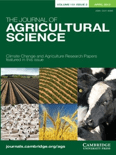
JOURNAL OF AGRICULTURAL SCIENCE
Nurturing Excellence in Agricultural ScholarshipJOURNAL OF AGRICULTURAL SCIENCE, published by Cambridge University Press, stands as a pivotal resource in the field of agricultural research. With a rich history dating back to 1905, this esteemed journal has consistently delivered cutting-edge scholarly articles that address pressing issues in agronomy, crop science, animal science, and genetics. Currently holding a Q2 ranking in Agronomy and Crop Science and Animal Science and Zoology, and a Q3 in Genetics, it reflects a robust impact within the academic community, contributing to innovative practices and technologies in agriculture. Indexed in Scopus, its authors benefit from broad visibility, supported by a strong readership among researchers, professionals, and students alike. While the journal does not currently offer open access, its rigorous peer-review process ensures that published works meet the highest scholarly standards, fostering a rich environment for knowledge exchange and advancement in agricultural science.
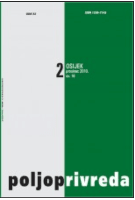
Poljoprivreda
Nurturing collaboration for global agricultural progress.Poljoprivreda is a distinguished open-access journal dedicated to the field of agronomy and crop science, published by the FAC Agriculture Osijek in Croatia. Since its inception in 2000, the journal has been committed to disseminating high-quality research that informs both academic and practical advancements in agriculture. With an ISSN of 1330-7142 and an E-ISSN of 1848-8080, Poljoprivreda provides a vital platform for researchers, professionals, and students to engage with the latest findings and methodologies in agronomy, contributing significantly to the enhancement of agricultural practices in Croatia and beyond. Although currently ranked in the 22nd percentile within its category according to Scopus, the journal aspires to elevate its standing by welcoming innovative research that addresses contemporary challenges within the agricultural sciences. By fostering open access since 2000, Poljoprivreda ensures that its scholarly content is freely available, promoting wider dissemination and collaborative opportunities among researchers globally.
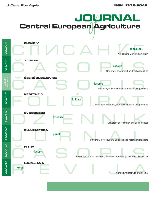
Journal of Central European Agriculture
Advancing Agricultural Knowledge Across Central EuropeThe Journal of Central European Agriculture, with ISSN 1332-9049 and E-ISSN 1332-9049, is an esteemed platform published by UNIV ZAGREB, FAC AGRICULTURE that caters to the dynamic fields of agronomy, crop science, and animal science. Since its establishment in 2000, this Open Access journal has played a crucial role in disseminating critical research findings while fostering collaboration among academics, researchers, and professionals within the agricultural community. The journal, which is based in the heart of Croatia, spans a rich history of scholarship, with its content available for free to readers and contributors alike. As reflected in its current standings, the journal has achieved a Quartile 3 ranking in Agronomy and Crop Science and Quartile 4 in Animal Science and Zoology for the year 2023, indicating its growing influence within these disciplines. With Scopus ranks placing it in the 32nd percentile among its peers, the Journal of Central European Agriculture is committed to advancing agricultural sciences not only in Central Europe but globally as it prepares for its converged years from 2007 through 2024. This journal serves as a vital resource for innovative research, practical applications, and a deeper understanding of agricultural challenges and solutions.

Legume Research
Unlocking the Potential of Legumes for Global ImpactLegume Research, published by the AGRICULTURAL RESEARCH COMMUNICATION CENTRE in India, is an essential peer-reviewed journal focusing on advancements in the field of agronomy, crop science, soil science, and plant science. With an ISSN of 0250-5371 and operating since 2008, this journal caters to researchers, agricultural professionals, and students interested in the critical role of legumes in sustainable agriculture and food security. It ranks within the third quartile (Q3) in several prominent categories, reflecting its contribution to the agricultural and biological sciences community—ranking #279 in Agronomy and Crop Science, #113 in Soil Science, and #376 in Plant Science based on Scopus metrics. Although not open access, Legume Research remains a vital resource for those seeking to enhance their knowledge and contribute novel research findings in the ever-evolving discipline of legume cultivation and utilization. With a clear objective to disseminate impactful research, this journal significantly contributes to the global understanding of legumes' ecological, economic, and nutritional importance.

SCIENTIA AGRICOLA
Nurturing the seeds of innovation in agriculture.SCIENTIA AGRICOLA is a prestigious, peer-reviewed journal published by UNIV SAO PAULO, ESALQ, dedicated to advancing the field of agricultural sciences. With the ISSN 1678-992X and an e-ISSN maintaining the same number, this Open Access journal has been a valuable resource since 1992, fostering wide dissemination of knowledge and research findings in agriculture. Hailing from Piracicaba, Brazil, associated with one of the leading agricultural universities, SCIENTIA AGRICOLA serves as an essential platform for researchers, practitioners, and students aiming to explore innovative agricultural practices, crop production, and sustainable techniques. Although specific metrics such as H-Index and Scopus Ranks were not provided, the journal's longstanding commitment to open access and impactful research underscores its importance in contributing to the global dialogue on agricultural efficiency and sustainability.
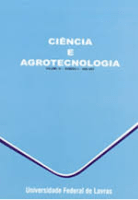
CIENCIA E AGROTECNOLOGIA
Pioneering Discoveries in Soil and Veterinary SciencesCIENCIA E AGROTECNOLOGIA, published by UNIV FEDERAL LAVRAS-UFLA, is a vital open-access journal since 2005 that serves as an influential platform for disseminating research in the fields of Agronomy, Animal Science, Food Science, Soil Science, and Veterinary Science. With its ISSN 1413-7054 and E-ISSN 1981-1829, this journal is recognized for its contribution to science and technology advancements in agriculture, particularly in Brazil, fostering knowledge exchange among researchers, professionals, and students. Currently ranked in the Q2 quartile for Agronomy and Crop Science, Animal Science and Zoology, and in the Q3 quartile for Food Science and Soil Science, it demonstrates a solid international standing in the relevant Scopus indices. The journal's commitment to open access ensures that critical research findings are freely available, enabling a broader impact and encouraging collaborative advancements in agritech. As the journal looks towards its converged years from 2007 to 2024, it continues to uphold its objectives of promoting sustainable practices and innovation within the agricultural sciences.